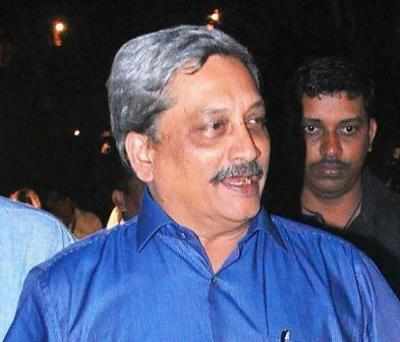- News
- India News
- Act East: Centre to send Parrikar at Shangri-La
Trending
This story is from May 7, 2016
Act East: Centre to send Parrikar at Shangri-La
The Centre has decided to send defence minister Manohar Parrikar to Shangri-La Dialogue (SLD), the most significant forum for exchange of ideas between the defence ministers of the Asia-Pacific, which has remained ignored so far. The Dialogue is scheduled to be held in first week of June.

Manohar Parrikar
NEW DELHI: One of the most strident criticisms of India’s diplomatic and defence policy-makers has been that they have ignored the Shangri-La Dialogue (SLD), the most significant forum for exchange of ideas between the defence ministers of the Asia-Pacific.
The Narendra Modi government now seems to be finally making up by deciding to send defence minister Manohar Parrikar to the Dialogue in the first week of June.
Top government sources confirmed Parrikar will address the SLD this year in Singapore, in a departure from the Centre’s decision last year to ignore the dialogue altogether.
As it chose not to send its defence minister to Singapore last year, the government faced flak from strategic affairs experts who said Modi had upgraded India’s Look East Policy to Act East “only in name”.
The NDA government was accused of following UPA’s policy of downgrading defence partnership with southeast Asia by ignoring SLD. As the defence minister of India from 2006 to 2014, A K Antony chose to address SLD only once.
Organized by Singapore’s International Institute for Strategic Studies, SLD provides the most important platform for addressing both “emerging as well as established regional security concerns” in the Asia-Pacific.
The SLD will be significant this year also because of the impending ruling by an international court of arbitration on a petition by Philippines challenging China’s territorial claims on the Spratly islands in South China Sea. China has refused to participate in the arbitration process.
Ouyang Yujing, director general of the Department of Boundary and Ocean Affairs of the Chinese foreign ministry, was on Friday quoted as having told CCTV, “China will not accept or recognise it. It is not the case that China does not want to resolve the issue. We want to resolve the territorial disputes through negotiations, as we have stated clearly in our agreements with the Philippines and the Declaration of Conduct with ASEAN”.
New Delhi’s own position on South China Sea was recently called into question when India, in a joint communique with China and Russia, called for resolving maritime disputes through bilateral negotiations and agreements. This seemed to dilute what many have described as India’s strategic boldness under Modi in making South China Sea feature in its summit engagements with the US. China maintains that the maritime disputes in the region must not be internationalised, a position endorsed by Russia.
The SLD was started in 2002, according to IISS, in response to the need for need for a forum where Asia-Pacific’s defence ministers could engage in dialogue aimed at building confidence and fostering practical security cooperation.
The Narendra Modi government now seems to be finally making up by deciding to send defence minister Manohar Parrikar to the Dialogue in the first week of June.
Top government sources confirmed Parrikar will address the SLD this year in Singapore, in a departure from the Centre’s decision last year to ignore the dialogue altogether.
As it chose not to send its defence minister to Singapore last year, the government faced flak from strategic affairs experts who said Modi had upgraded India’s Look East Policy to Act East “only in name”.
In fact, Singapore had invited Modi himself for SLD 2015 but he chose not to visit, raising questions about India’s new strategic courage in dealing with southeast Asian countries who seemed intimidated by Chinese assertiveness, if not belligerence.
The NDA government was accused of following UPA’s policy of downgrading defence partnership with southeast Asia by ignoring SLD. As the defence minister of India from 2006 to 2014, A K Antony chose to address SLD only once.
Organized by Singapore’s International Institute for Strategic Studies, SLD provides the most important platform for addressing both “emerging as well as established regional security concerns” in the Asia-Pacific.
The SLD will be significant this year also because of the impending ruling by an international court of arbitration on a petition by Philippines challenging China’s territorial claims on the Spratly islands in South China Sea. China has refused to participate in the arbitration process.
Ouyang Yujing, director general of the Department of Boundary and Ocean Affairs of the Chinese foreign ministry, was on Friday quoted as having told CCTV, “China will not accept or recognise it. It is not the case that China does not want to resolve the issue. We want to resolve the territorial disputes through negotiations, as we have stated clearly in our agreements with the Philippines and the Declaration of Conduct with ASEAN”.
New Delhi’s own position on South China Sea was recently called into question when India, in a joint communique with China and Russia, called for resolving maritime disputes through bilateral negotiations and agreements. This seemed to dilute what many have described as India’s strategic boldness under Modi in making South China Sea feature in its summit engagements with the US. China maintains that the maritime disputes in the region must not be internationalised, a position endorsed by Russia.
The SLD was started in 2002, according to IISS, in response to the need for need for a forum where Asia-Pacific’s defence ministers could engage in dialogue aimed at building confidence and fostering practical security cooperation.
End of Article
FOLLOW US ON SOCIAL MEDIA










